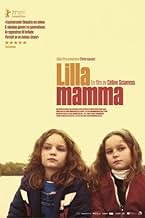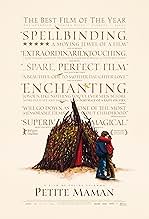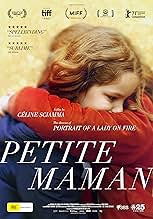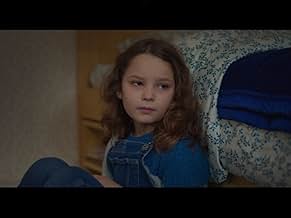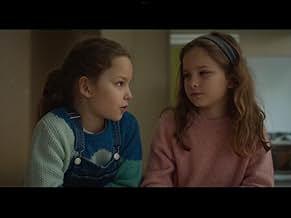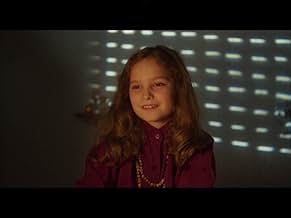IMDb रेटिंग
7.4/10
20 हज़ार
आपकी रेटिंग
अपनी भाषा में प्लॉट जोड़ेंNelly has just lost her grandmother and is helping her parents clean out her mother's childhood home. She explores the house and the surrounding woods. One day she meets a girl her age build... सभी पढ़ेंNelly has just lost her grandmother and is helping her parents clean out her mother's childhood home. She explores the house and the surrounding woods. One day she meets a girl her age building a tree-house.Nelly has just lost her grandmother and is helping her parents clean out her mother's childhood home. She explores the house and the surrounding woods. One day she meets a girl her age building a tree-house.
- 1 BAFTA अवार्ड के लिए नामांकित
- 9 जीत और कुल 37 नामांकन
फ़ीचर्ड समीक्षाएं
A hot take: this really needed more Totoro or Cat-Bus. Wouldn't it have been something to see Marion and/or Nelly chilling out on the belly of a cute little troll with black wood sprites flying about?
My comparison to Miyazaki isn't some big leap or accident as Celine Sciamma has been up front about the inspirations for her film. What I took from this was maybe something that is perhaps an extrapolation of how it was made which is, since it has to be in 2020 into early 2021, a Covid-era pandemic movie. That it begins with a little girl saying Au revoir to several seniors at an old age home from which her grandma just died (don't forget as the cliche and song go the Children are the Future) can't be completely accidental or coincidental, and if she wrote it in some sense as a way of coping or reckoning with this period in time I get it. That it's also about the girl/Nelly's mother going away to some operation tracks back to Totoro and that idea of expressing a childhood point of view but with a dollop of surrealism/magic realism (spoiler, the other little girl, who is played by the performer's twin, is supposed to be not simply a little friend but the title character).
I find coming to this after it seems practically everyone else I follow critically has watched it and heaped buckets of praise on it that I'm somewhat outside the pack simply calling it *good* and not some total masterwork (my better half couldn't stand it but that's another story). I come to this also as a big fan of 'Portrait' and had high hopes for whatever she had to offer. I like Sciamma as a director, I like how she has a gentle and delicate sensibility with her performers and has these patient frames. From my limited perspective on her style (only seen these two for now) you're either completely immersed in her existential cinematic grammar or you're not. I was here up to a point, but wanted something.... more. Or perhaps even less.
At 70 minutes this is a thin slice of storytelling, but that's hardly a negative. Authors for centuries have created novellas and short novels that contain multitudes on the human condition. Maybe some of my lack of connection here is not for disliking what she does so much as what is not here or left out. This is a story that has grief as a theme, but aside from a couple of instances where the little girls have fun making pancakes or spitting out a little bit of bad soup, they're restrained... maybe so restrained that it feels uneasy at times. Maybe that's part of the point, but I had to wonder if it was because these are girls who haven't acted much before that Sciamma had them do less because she knew they couldn't or simply by design of the script.
Either way there is that and also the distinct lack of music. That of course, as in Portrait of a Lady on Fire, leads to an astonishing point where music does come in near the end. But aside from that and maybe one other small moment there isn't any score here, and it's so quiet that it's maybe too quiet for a story about girls (yes even as one is the Maman) who form a connection. Or to put it another way, it's a story with a kind of slightly heightened magical sense, maybe akin to something out of Rivette, and it's played so straight that ALL the work is on us as the audience to interpret. Again, I don't mind that work, but even at 70 minutes it asks a lot emotionally.
I don't mean to give the impression I wasnt captivated by this or admire it as I certainly do, but perhaps it edges to being slightly overrated as well. As either a short film at 30 minutes or a longer feature it could either condense its ideas into something still as profound but more to the point (still keeping her patience and time in scenes), or as a longer feature with more time with Nelly and/or Marion and the parents. It's a gentle little movie that is pretty and in its own muted dimensions charming, but I don't see it staying with me as long as her other film and didn't hit the kind of chord maybe I'm just looking for more after these last two years (ironically Portrait was one of the last films I saw in a theater before lockdown).
My comparison to Miyazaki isn't some big leap or accident as Celine Sciamma has been up front about the inspirations for her film. What I took from this was maybe something that is perhaps an extrapolation of how it was made which is, since it has to be in 2020 into early 2021, a Covid-era pandemic movie. That it begins with a little girl saying Au revoir to several seniors at an old age home from which her grandma just died (don't forget as the cliche and song go the Children are the Future) can't be completely accidental or coincidental, and if she wrote it in some sense as a way of coping or reckoning with this period in time I get it. That it's also about the girl/Nelly's mother going away to some operation tracks back to Totoro and that idea of expressing a childhood point of view but with a dollop of surrealism/magic realism (spoiler, the other little girl, who is played by the performer's twin, is supposed to be not simply a little friend but the title character).
I find coming to this after it seems practically everyone else I follow critically has watched it and heaped buckets of praise on it that I'm somewhat outside the pack simply calling it *good* and not some total masterwork (my better half couldn't stand it but that's another story). I come to this also as a big fan of 'Portrait' and had high hopes for whatever she had to offer. I like Sciamma as a director, I like how she has a gentle and delicate sensibility with her performers and has these patient frames. From my limited perspective on her style (only seen these two for now) you're either completely immersed in her existential cinematic grammar or you're not. I was here up to a point, but wanted something.... more. Or perhaps even less.
At 70 minutes this is a thin slice of storytelling, but that's hardly a negative. Authors for centuries have created novellas and short novels that contain multitudes on the human condition. Maybe some of my lack of connection here is not for disliking what she does so much as what is not here or left out. This is a story that has grief as a theme, but aside from a couple of instances where the little girls have fun making pancakes or spitting out a little bit of bad soup, they're restrained... maybe so restrained that it feels uneasy at times. Maybe that's part of the point, but I had to wonder if it was because these are girls who haven't acted much before that Sciamma had them do less because she knew they couldn't or simply by design of the script.
Either way there is that and also the distinct lack of music. That of course, as in Portrait of a Lady on Fire, leads to an astonishing point where music does come in near the end. But aside from that and maybe one other small moment there isn't any score here, and it's so quiet that it's maybe too quiet for a story about girls (yes even as one is the Maman) who form a connection. Or to put it another way, it's a story with a kind of slightly heightened magical sense, maybe akin to something out of Rivette, and it's played so straight that ALL the work is on us as the audience to interpret. Again, I don't mind that work, but even at 70 minutes it asks a lot emotionally.
I don't mean to give the impression I wasnt captivated by this or admire it as I certainly do, but perhaps it edges to being slightly overrated as well. As either a short film at 30 minutes or a longer feature it could either condense its ideas into something still as profound but more to the point (still keeping her patience and time in scenes), or as a longer feature with more time with Nelly and/or Marion and the parents. It's a gentle little movie that is pretty and in its own muted dimensions charming, but I don't see it staying with me as long as her other film and didn't hit the kind of chord maybe I'm just looking for more after these last two years (ironically Portrait was one of the last films I saw in a theater before lockdown).
From the writer-director of Portrait of a Lady on Fire comes yet another tender, touching & heartfelt drama fantasy that may not have the same intense, intoxicating passion brewing under the surface but it sure exhibits a similar intimacy in its approach. Petite Maman is a delicately crafted story that looks at love, loss, grief & innocence through the eyes of an 8-year old girl.
Written & directed by Céline Sciamma, the film is only 70 mins long and follows a young girl coping with the death of her grandmother by bonding with her mother. Sciamma's nuanced portrait of childhood & imagination allows her to address the necessary themes by merging harsh realism with fantastical escape, thus preserving the innocence & purity of youth, while narrating her tale with sensitivity.
Despite the brief runtime, Sciamma never hurries through the proceedings and lets the story unfold & unravel at its own pace. The film is also shot with elegance, told with compassion & benefits from sincere performances from the whole cast. Joséphine Sanz plays her part with emotional honesty under Sciamma's supervision and she is well-supported by her twin sister who plays the 8-year old version of her mother.
Overall, Petite Maman finds beauty in simplicity and is another fascinating addition to Céline Sciamma's oeuvre. A sweet & poignant story about coping & bonding between a daughter & her mother that's rendered on screen with unfailing warmth & tenderness, Sciamma's latest is as arresting on visual fronts as it is stirring on the emotional scale, and doesn't make the mistake of overstaying its welcome. Definitely recommended.
Written & directed by Céline Sciamma, the film is only 70 mins long and follows a young girl coping with the death of her grandmother by bonding with her mother. Sciamma's nuanced portrait of childhood & imagination allows her to address the necessary themes by merging harsh realism with fantastical escape, thus preserving the innocence & purity of youth, while narrating her tale with sensitivity.
Despite the brief runtime, Sciamma never hurries through the proceedings and lets the story unfold & unravel at its own pace. The film is also shot with elegance, told with compassion & benefits from sincere performances from the whole cast. Joséphine Sanz plays her part with emotional honesty under Sciamma's supervision and she is well-supported by her twin sister who plays the 8-year old version of her mother.
Overall, Petite Maman finds beauty in simplicity and is another fascinating addition to Céline Sciamma's oeuvre. A sweet & poignant story about coping & bonding between a daughter & her mother that's rendered on screen with unfailing warmth & tenderness, Sciamma's latest is as arresting on visual fronts as it is stirring on the emotional scale, and doesn't make the mistake of overstaying its welcome. Definitely recommended.
Fairy tales do come true, or so Disney would have us believe. The French, as in writer/director Celine Sciamma's Petite Maman, make a whimsical tale come true by using a technique Walt would have appreciated, magical realism.
When an eight-year-old girl, Nelly (Josephine Sanz), meets her eight-year-old mother, Marion (Gabrielle Sanz), not only do they make you believe, but they also give dignity to a deeply-embedded longing we have to know our parents when they were our age.
This all-too-brief 72 min fantasy reaches an imaginative high whereby the soft and precise longings of a bright adolescent girl to hold onto her mother take place in the traditional forest of fairy tales. Mom had built a hut here long ago and now emerges to greet her daughter, same age 8. They bond immediately, laugh girlie silly, and generally devour their friendship.
As in fairy tales and life itself, the romance must end, especially since mom's operation on her leg is imminent, evidenced by her using her cane. Although the timing of the events is not always linear, Sciamma has made it clear she is not interested in accuracy but rather in the honesty of the emotions and the arc of the characters.
While Sciamma crafted a far more popular, potboiling Portrait of a Lady on Fire, Petite Maman is like its title, a minimalist ode to the challenges of longing inherent in the mother-daughter romance. There will never be enough time, and no one will be able to know completely the most important person in their lives. Yet, Sciamma shows that small moments loom large in the memory, as when Nelly feeds mom cheese puffs from the back of the car, while Marion is driving. It's a ritual that binds.
The Sanz twins (they call themselves "sisters born on the same day) are like fantasy actors, smart but not overbearing, never too cute but abnormally insightful. They deliver the emotional heart of this low-key film that posits a child may fantastically come to know a mother as a real person. Petite Maman is a lyrical song to mother and daughters, who never know their mothers well enough until a brilliant filmmaker shows them how.
The best fantasy this year, the best mother-daughter tale ever.
When an eight-year-old girl, Nelly (Josephine Sanz), meets her eight-year-old mother, Marion (Gabrielle Sanz), not only do they make you believe, but they also give dignity to a deeply-embedded longing we have to know our parents when they were our age.
This all-too-brief 72 min fantasy reaches an imaginative high whereby the soft and precise longings of a bright adolescent girl to hold onto her mother take place in the traditional forest of fairy tales. Mom had built a hut here long ago and now emerges to greet her daughter, same age 8. They bond immediately, laugh girlie silly, and generally devour their friendship.
As in fairy tales and life itself, the romance must end, especially since mom's operation on her leg is imminent, evidenced by her using her cane. Although the timing of the events is not always linear, Sciamma has made it clear she is not interested in accuracy but rather in the honesty of the emotions and the arc of the characters.
While Sciamma crafted a far more popular, potboiling Portrait of a Lady on Fire, Petite Maman is like its title, a minimalist ode to the challenges of longing inherent in the mother-daughter romance. There will never be enough time, and no one will be able to know completely the most important person in their lives. Yet, Sciamma shows that small moments loom large in the memory, as when Nelly feeds mom cheese puffs from the back of the car, while Marion is driving. It's a ritual that binds.
The Sanz twins (they call themselves "sisters born on the same day) are like fantasy actors, smart but not overbearing, never too cute but abnormally insightful. They deliver the emotional heart of this low-key film that posits a child may fantastically come to know a mother as a real person. Petite Maman is a lyrical song to mother and daughters, who never know their mothers well enough until a brilliant filmmaker shows them how.
The best fantasy this year, the best mother-daughter tale ever.
... just like eight year old Nelly, whose vivid imagination is brought to life when she meets her doppelganger Marion after her mother absents herself from her life for a few days. Beautifully filmed and acted, it may get you reflecting on your own perceptions of the world when you were that age or even as you got older, if you were lucky enough to carry that imagination with you.
Petite Maman is a very understated, reflective, and almost meditative film.
Celine Sciamma uses her stripped back and beautiful film making to highlight the characters and their relationships in such sensitive way.
We follow a young girl dealing with grief and loss, which is explored through a poignantly played out time travel scenario.
It's a very short film, but with a lot of emotion, power, and humour packed in.
The two young leads are great, and with not much of a supporting cast at all they had to be.
A beautiful story with beautiful direction. Lovely.
Celine Sciamma uses her stripped back and beautiful film making to highlight the characters and their relationships in such sensitive way.
We follow a young girl dealing with grief and loss, which is explored through a poignantly played out time travel scenario.
It's a very short film, but with a lot of emotion, power, and humour packed in.
The two young leads are great, and with not much of a supporting cast at all they had to be.
A beautiful story with beautiful direction. Lovely.
क्या आपको पता है
- ट्रिवियाCéline Sciamma served as costume designer as well as writer and director for the film, as she did for Bande de filles (2014).
- क्रेज़ी क्रेडिटDuring the end credits the lyrics to the song are displayed one word at a time in the lower left corner.
- साउंडट्रैकLa Musique du Futur
Composed by Jean-Baptiste de Laubier
Arranged by Arthur Simonini
Lyrics by Céline Sciamma
Interpreted by the Maîtrise Notre Dame de Paris
© Lilies Films / Para One / Savoir Faire
(p) 2021 Lilies Films
टॉप पसंद
रेटिंग देने के लिए साइन-इन करें और वैयक्तिकृत सुझावों के लिए वॉचलिस्ट करें
- How long is Petite Maman?Alexa द्वारा संचालित
विवरण
- रिलीज़ की तारीख़
- कंट्री ऑफ़ ओरिजिन
- आधिकारिक साइटें
- भाषा
- इस रूप में भी जाना जाता है
- Petite Maman
- फ़िल्माने की जगहें
- उत्पादन कंपनियां
- IMDbPro पर और कंपनी क्रेडिट देखें
बॉक्स ऑफ़िस
- बजट
- €28,00,000(अनुमानित)
- US और कनाडा में सकल
- $8,29,065
- US और कनाडा में पहले सप्ताह में कुल कमाई
- $45,764
- 24 अप्रैल 2022
- दुनिया भर में सकल
- $19,90,331
- चलने की अवधि1 घंटा 13 मिनट
- रंग
- पक्ष अनुपात
- 1.85 : 1
इस पेज में योगदान दें
किसी बदलाव का सुझाव दें या अनुपलब्ध कॉन्टेंट जोड़ें



![Bande-annonce [OV]](https://m.media-amazon.com/images/M/MV5BODAyNjc2ODQtODczMi00YThiLWI0ODMtZDE5M2I3NWQ2YmNjXkEyXkFqcGdeQXRyYW5zY29kZS13b3JrZmxvdw@@._V1_QL75_UX500_CR0)

